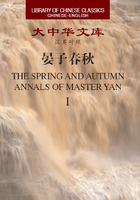
3.12 [62] 景公问谋必得事必成何术晏子对以度义因民
齐景公问谋划一定有收获做事情一定成功有什么办法,晏子回答说要符合道义顺从百姓
【原文】
景公问晏子曰:“谋必得,事必成,有术乎?”晏子对曰:“有。”公曰:“其术如何?”晏子曰:“谋度于义者必得,事因于民者必成。”公曰:“奚谓也?”对曰:“其谋也,左右无所系,上下无所靡,其声不悖,其实不逆,谋于上,不违天,谋于〔下〕,不违民,以此谟者必得矣;事大则利厚,事小则利薄,称事之大小,权利之轻重,国有义劳,民有(如)〔加〕利,以此举事者必成矣。夫逃(人)〔义〕而谟,虽成不安;傲民举事,虽成不荣。故臣闻义、谋之法(者)〔也〕,民、事之本也,故(及)〔反〕义而谋,(信)〔倍〕民而动,未闻存者也。昔三代之兴也,谋必度(其)〔于〕义,事必因于民。及其衰也,建谋者(及)〔反〕义,兴事〔者〕伤民。故度义因民,谋事之术也。”公曰:“寡人不敏,闻善不行,其(已)〔危〕如何?”对曰:“上君全善,其次出入焉,其次结邪而羞问。全善之君能制;出入之君、时问之君,虽日危,尚可以没身;羞问之君,不能保其身。今君虽危,尚可没其身也。”
【今译】
3.12 [62] DUKE JING INQUIRED REGARDING THE M ETHOD BY W H ICH PLANS ARE CERTA IN TO ACHIEVE THEIR PURPOSE AND UNDERTAK INGS TO BE ACCOM PLISHED. YANZI REPLIED THAT THESE PLANS AND UNDERTAKINGS SHOULD BE MEASURED BY RIGHTEOUSNESS AND CONFORMANCE TO THE NEEDS OF THE PEOPLE.
Duke Jing queried Yanzi as follows: “Is there a method by which plans are certain bound to achieve their purpose and undertakings bound to be accomplished?”
Yanzi replied: “There is.”
The Duke said: “What is this method?”
Yanzi said: “Those plans that are based on righteousness are certain to succeed,and undertakings that conform to the needs of the people are certain to be accomplished.”
They Duke said: “What do you mean?”
Yanzi replied: “One who m akes p lans,w ith no one among his entourage to tie him down and no one among the superiors and inferiors to harness[1] him; whose words are not contradictory and whose deeds are not perverse; and who in consultation w ith superiors,does not defy Heaven,and with inferiors does not defy the people—one who plans thus is sure to achieve his purpose. When one’s undertakings are great,then benefits are abundant; when they are small,benefits are meager. Measure the size of the undertaking,reckon the weight of benefits,and the state w ill have fair labor and the people w ill have additional benefits. Those who initiate undertakings in this way w ill certainly accomplish them. If one avoids righteousness in making plans,even if these plans are accomplished,one w ill not be at peace. If one initiates undertakings w ith an attitude of arrogance towards the people,even if these undertakings are accomplished,one w ill not be glorified. Hence,I have heard that righteousness is the correct model for planning and the people are the foundation of all undertakings. Therefore,to my know ledge,no one who makes plans contrary to righteousness and takes action that is hostile to the people has ever survived. Formerly,in the heyday of the Three Dynasties,plans were always measured by standards of righteousness and undertakings were always grounded in the people. When these dynasties declined,those who promoted plans acted against righteous principles,and those who initiated undertakings harmed the people. Therefore,righteous measurement and conformance to the needs of the people constitute the art of planning and undertaking affairs.”
The Duke said: “I am not that bright. I am taught to do good,but do not act on it—is this a cause for danger?”
Yanzi rep lied: “The best ruler is perfect; the next best is mediocre; and the one that comes next is he who allies himself w ith evil and is embarrassed to raise questions. The perfect ruler is able to control; the mediocre ruler raises questions occasionally;[2] although he may face danger,his life may still end from natural causes. The ruler who is embarrassed to raise questions cannot die naturally. Now you,my Lord,although you are in danger,you can still die naturally.”
注释
[1]靡→縻 (YZCQ-ICS,26,n. 1).
[2]出入之君时问 (YZCQ-ICS,26,n. 5).